Külli Luha
Analyst of the Courts Division of the Ministry of Justice
Summary of the procedural statistics of the county, administrative and circuit courts in 2021: matters adjudicated (including paperless proceeding) and the average workload of judges.
In 2021 county courts received 34,251 civil matters (1.8% more than in 2020) and 43,676 matters of expedited procedures of payment orders (15.6% less than in 2020), 13,874 criminal procedure matters[1], including 4764 criminal matters (8.6% less than in 2020); and 5,500 misdemeanour matters (7.6% less than in 2020). Administrative courts processed 3119 administrative matters (14.0% more than in 2020).
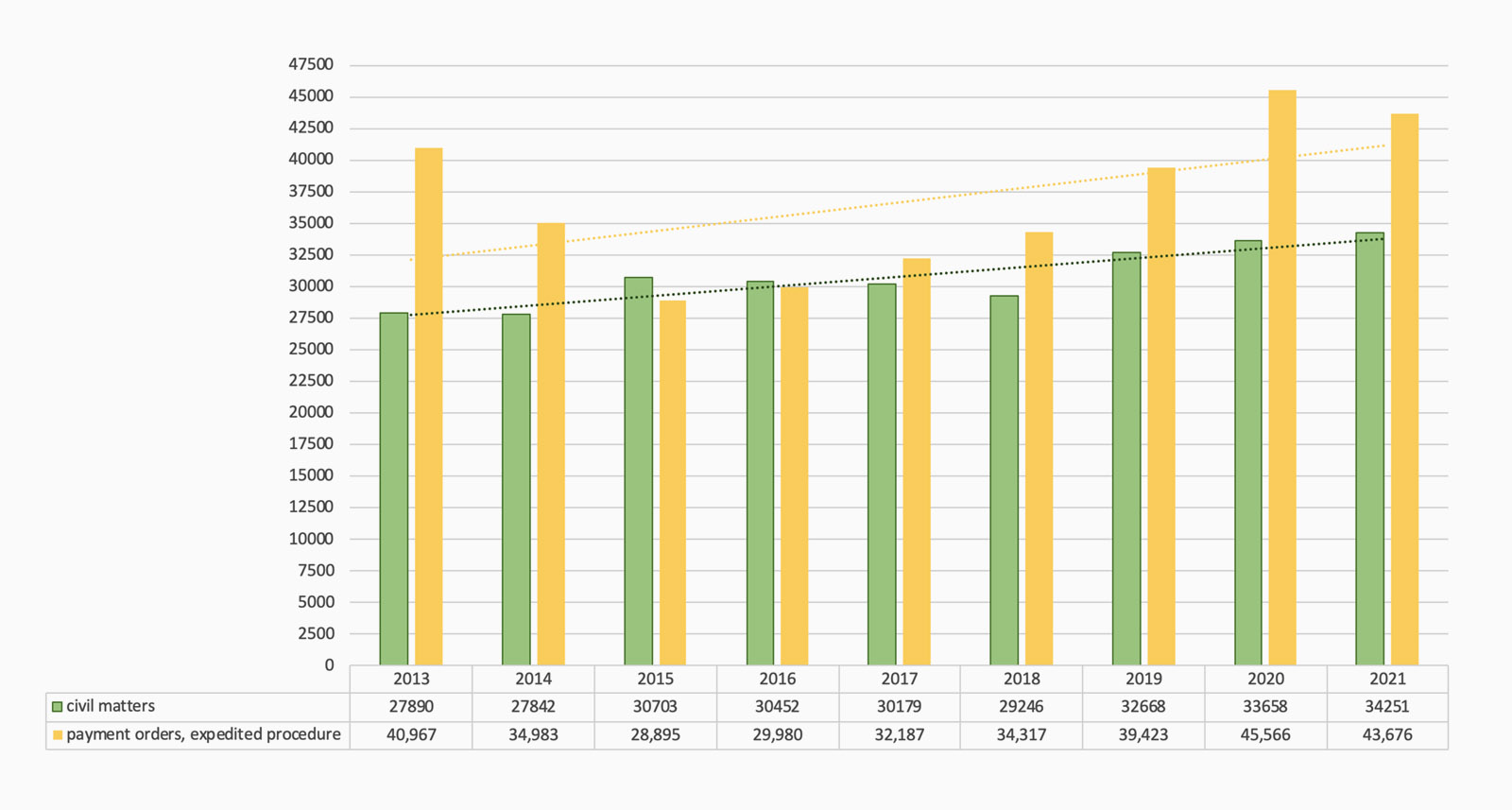

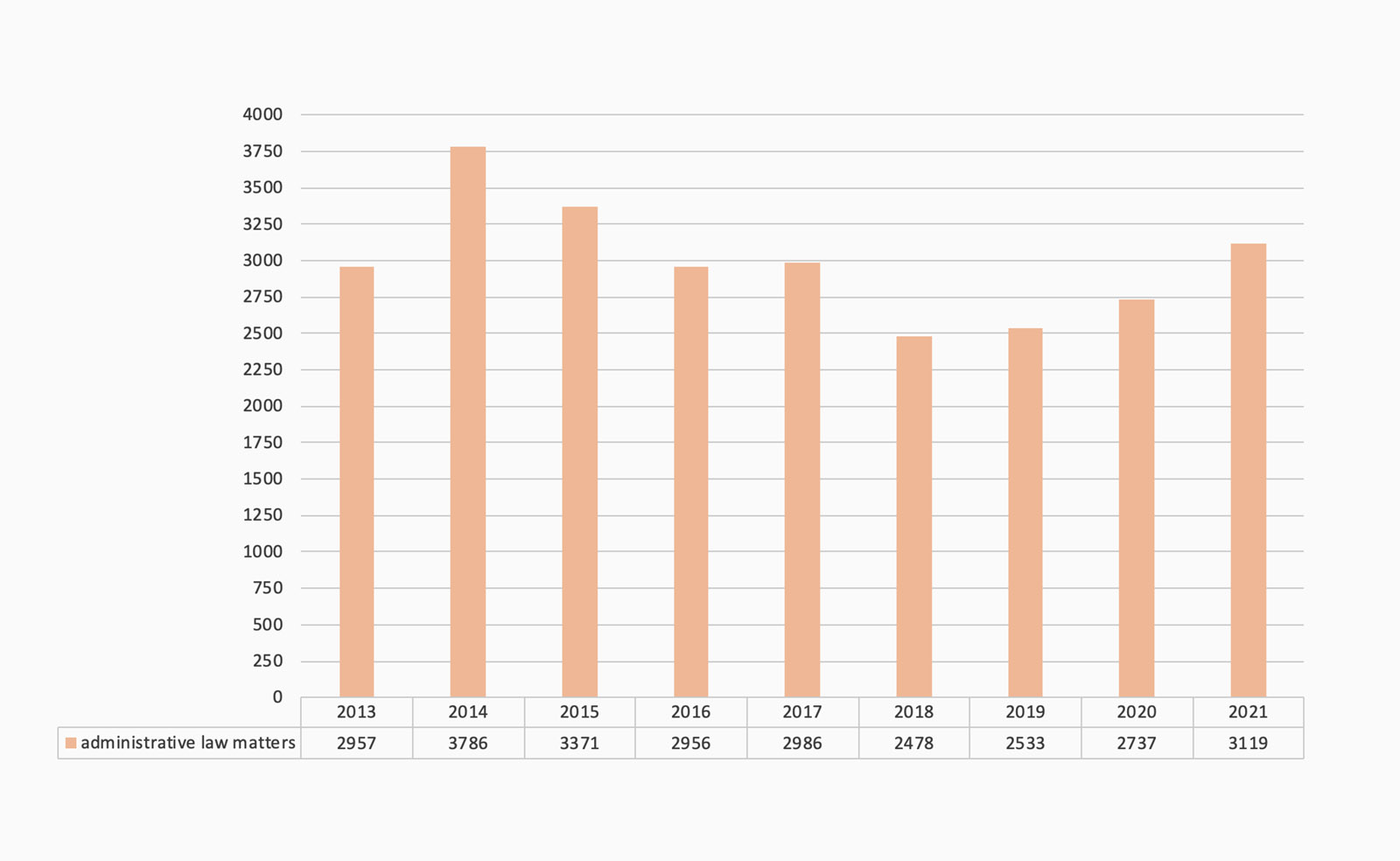
The circuit courts received, in appeals and appeals against court rulings, a total of 3078 civil matters (9.3% more than in 2020), 1288 administrative matters (19.5% more than in 2020), 1818 criminal procedure matters (3.0% less than in 2020) and 143 misdemeanour matters.
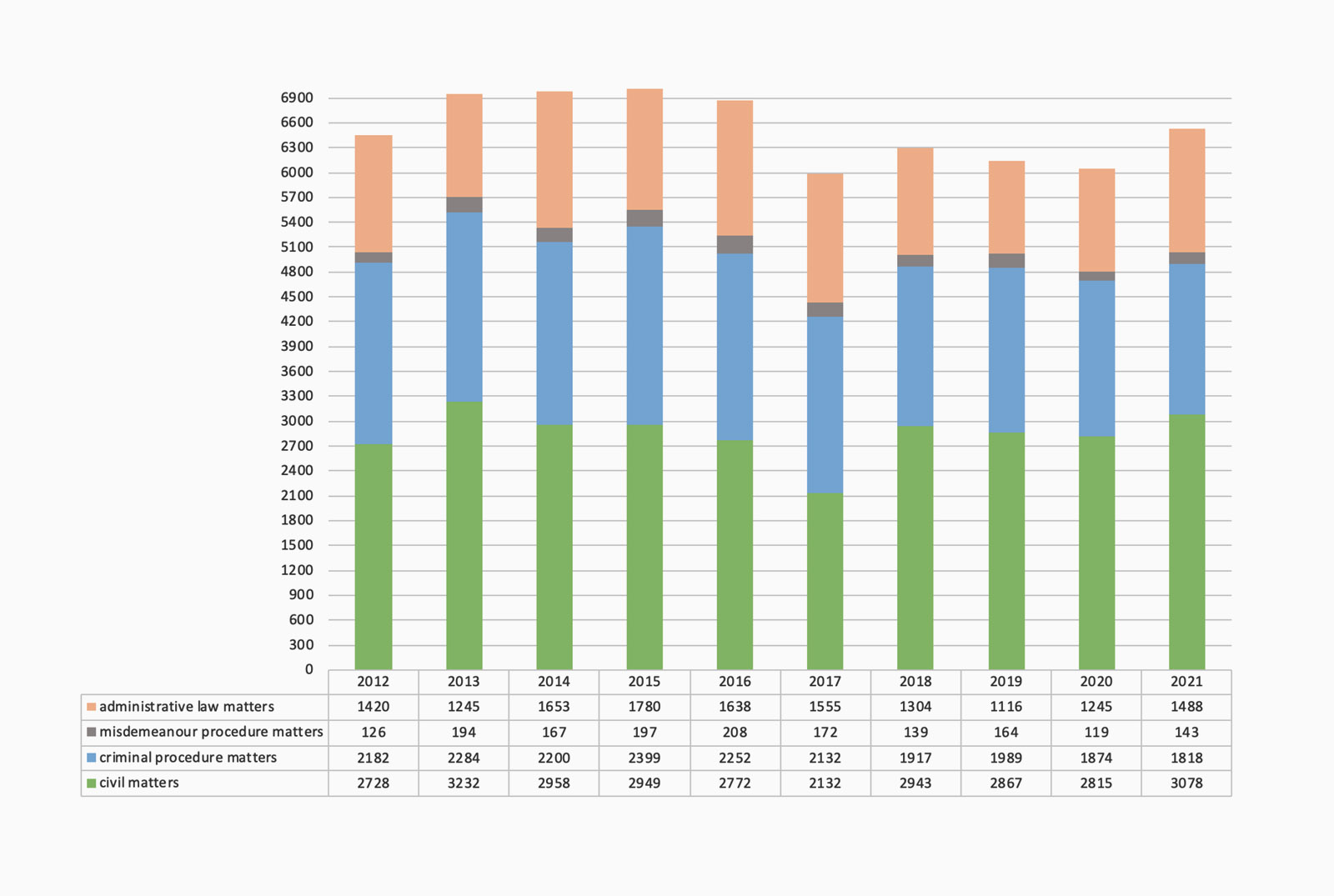
Detailed procedural statistics on courts of the first and second instance listed by types of proceeding are published on the courts website.[3]
Workload of judges on the basis of matters received during 2021
In 2021, civil matters were distributed to a total of 88.2[4] judges: 40.9 judges in Harju County Court, 12.6 in Pärnu County Court, 21.3 in Tartu County Court and 13.4 in Viru County Court. Criminal and misdemeanour proceedings were distributed in county courts to a total of 56.0 judges: 21.8 judges in Harju County Court, 7.9 in Pärnu County Court, 13.1 in Tartu County Court and 13.2 in Viru County Court.
Since 1 January 2021, the county courts have a total of 153 positions of judges, but considering the vacant judge positions consequent suspension of distribution of matters and long absences, the share of vacancies or temporarily unfilled posts in county courts was 5.8% (including 7.8% in Harju County Court, 2.4% in Pärnu County Court, 4.4% in Tartu County Court and 5.3% in Viru County Court).
In 2021, administrative matters were distributed to 23.0 judges: 15.3 judges in Tallinn Administrative Court and 7.7 judges in Tartu Administrative Court. In 2021, there were 25 judge positions in the administrative courts. However, considering the vacancies of judges and consequent suspensions of distribution of matters and long absences, the share of vacancies or temporarily unfilled posts in administrative courts was 8.2% (including 10.0% in Tallinn Administrative Court and 4.4% in Tartu Administrative Court).
In circuit courts, civil matters were distributed to 21.0 judges in the civil chamber: 15.1 in Tallinn and 5.9 in Tartu. Criminal and misdemeanour matters were distributed to 12.0 judges in the criminal chamber: 7.0 in Tallinn and 5.0 in Tartu; and administrative matters were distributed to 10.5 judges in the administrative law chamber: 6.5 in Tallinn and 4.0 in Tartu. The circuit courts have total of 46 positions of judges. However, considering vacant judge positions and consequent suspensions of distribution of matters and long absences, the share of vacancies or temporarily unfilled posts was 5.5%.
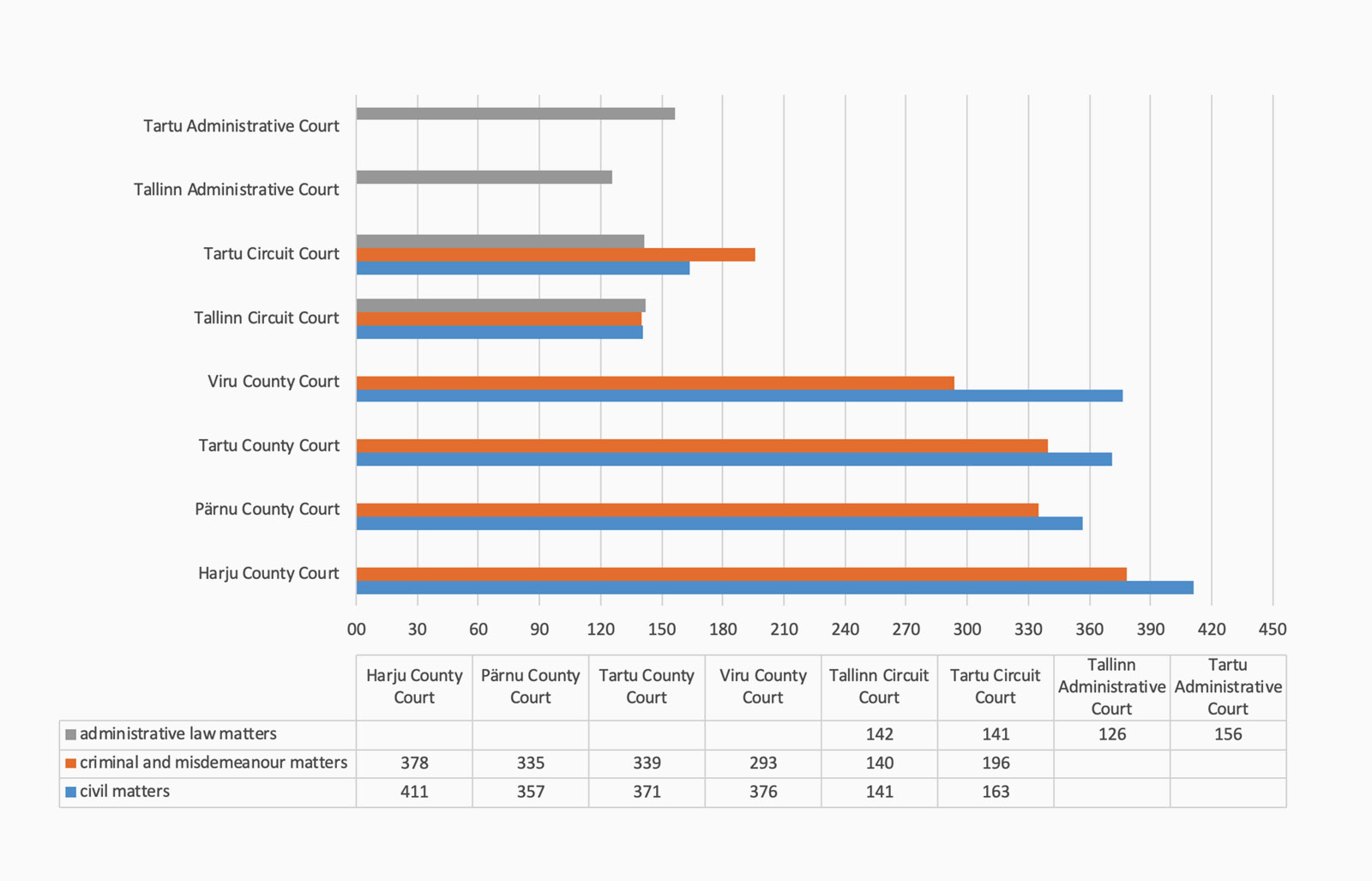
To more precisely assess workload, the county and administrative courts started applying court workload methodology in 2021. The following figure shows the average workload, based on workload points, both for the position and for a so-called statistical judge. Similarly to position load, the actual workload is also expressed in aggregate in Figure 6. The average workload of the “statistical judge” was found on the basis of the sum of the criminal/misdemeanour matter and civil matter load points. Figure 6 shows that the actual workload in all courts was greater than the position load. The least difference was in Pärnu and Tartu County Court, which may vary from Figure 6 based on the type of proceeding. The greatest difference between position load and actual load was in Tallinn Administrative Court: 11%.
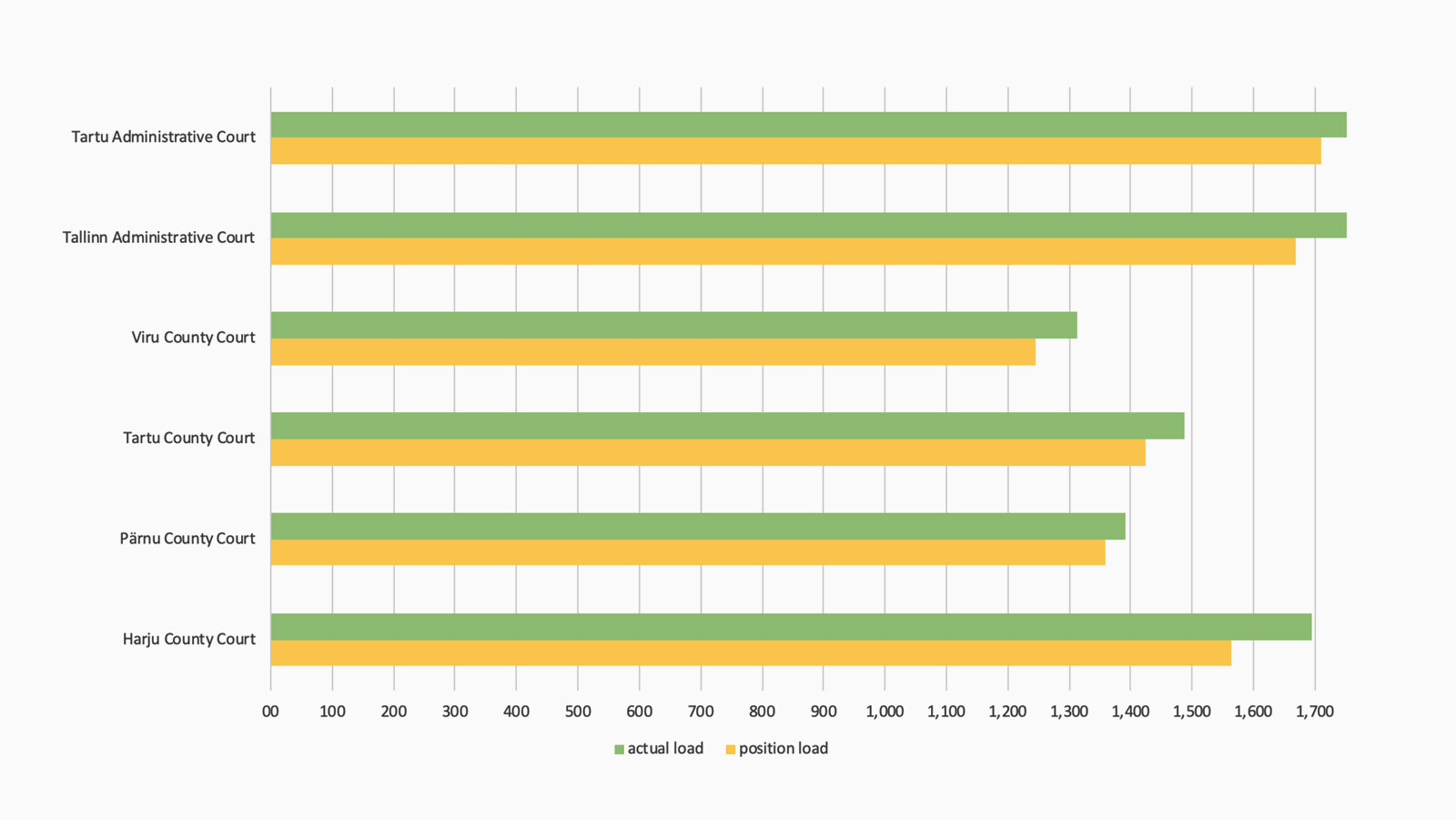
Adjudication of matters in county courts: civil matters
County courts adjudicated 33,952 civil matters: 16,973 in Harju County Court, 4297 in Pärnu County Court, 7843 in Tartu County Court and 4839 in Viru County Court.
Going by the content of the adjudicated matters, the matters adjudicated in 2021 fell into the usual sectors. Most (70.3%) comprised matters under family law, law of obligations and General Part of the Civil Code Act (TsÜS). The number and share of insolvency matters decreased.
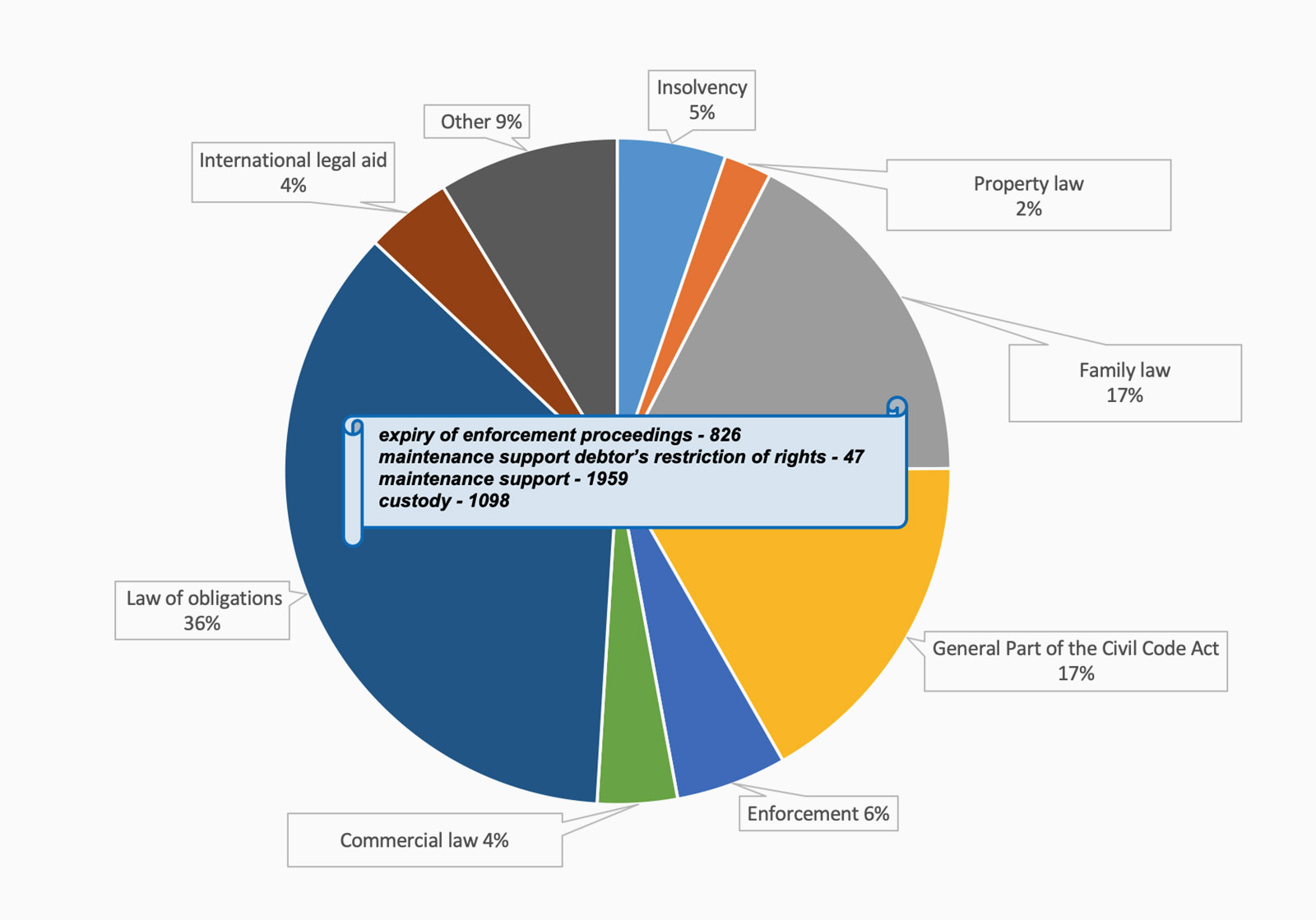
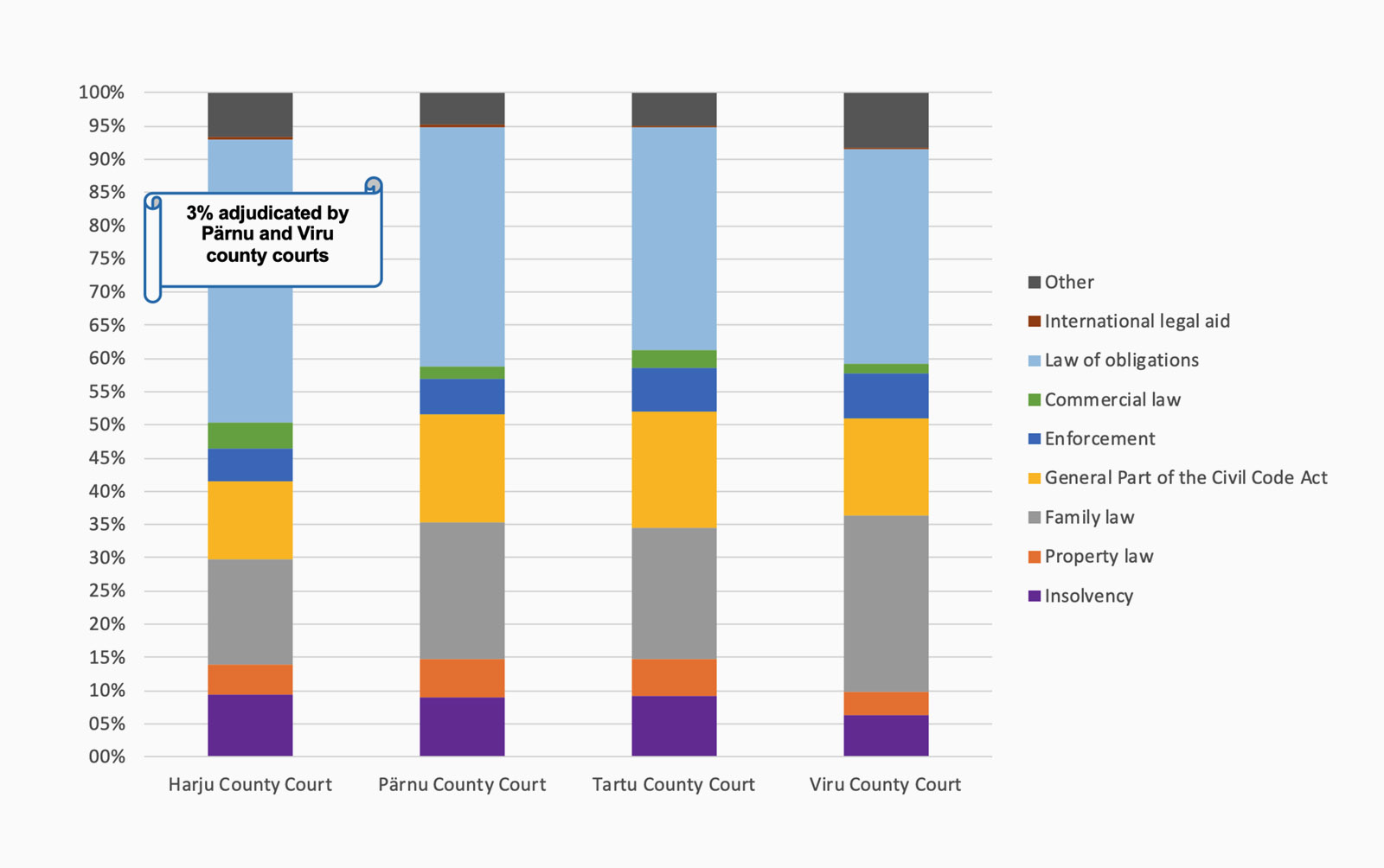
Total average procedural time of civil matters adjudicated in 2021 in county courts was 101 days: 114 days in Harju County Court, 108 in Pärnu County Court, 78 in Tartu County Court and 88 in Viru County Court.
Although the total average procedural time has remained almost the same over the years, the average procedural time on civil matters substantively resolved in action has become significantly longer (about 40% longer than in 2015). Differences between county courts have also increased. For instance, the difference in procedural time in county courts in 2015 was 13%; the figure was 50% in 2021 (figure 9). A trend common to county courts is the longer procedural time. For example, the procedural time in Harju County Court has seen a stable lengthening trend – 46% longer in 2021 than it was in 2017. The procedural time on matters substantively resolved in action in Tartu County Court has fluctuated each year and was nearly the same in 2021 as it was in 2017.
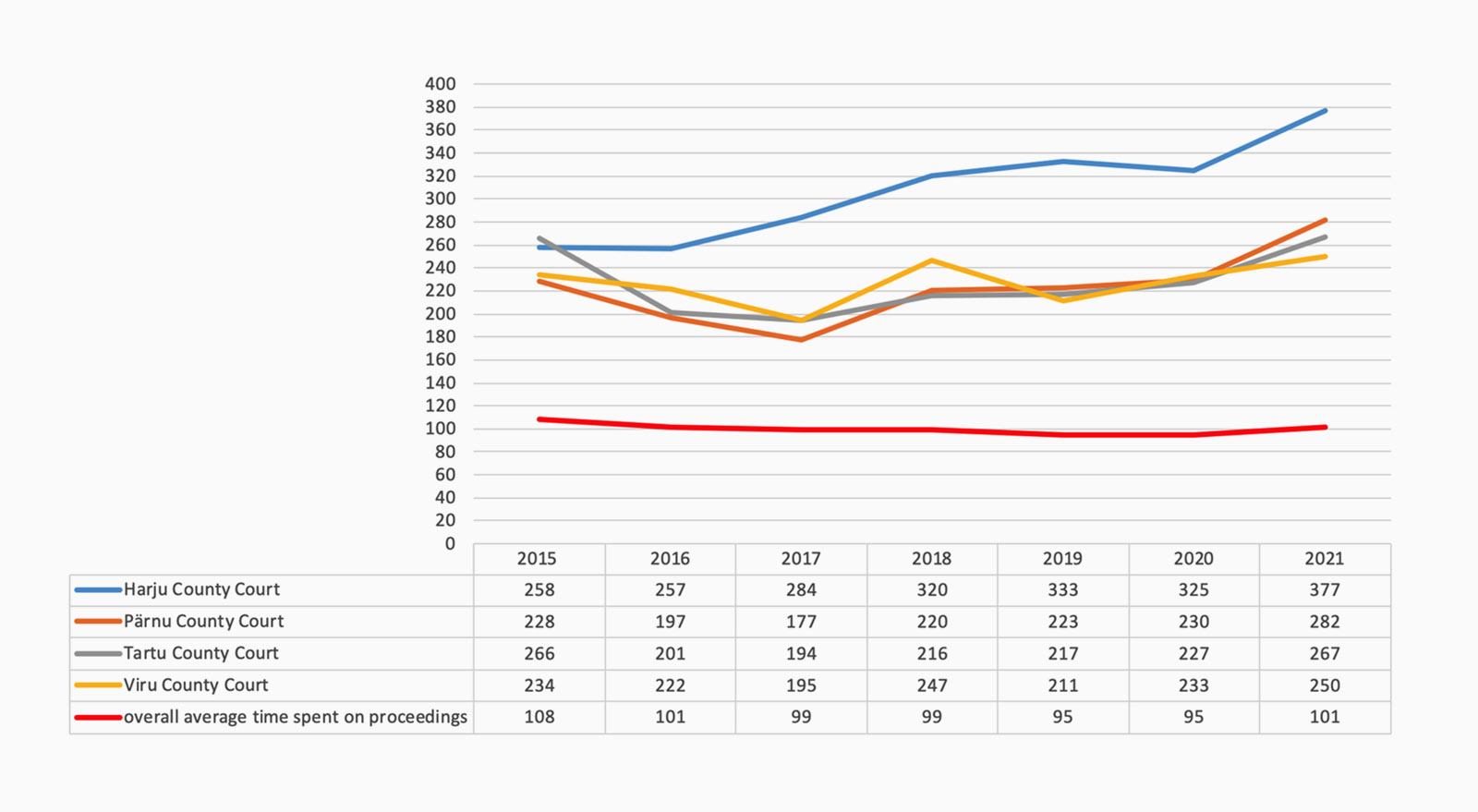
In 2021, a total of 14,619 supervision proceedings were conducted in county courts, 65% of which were supervision proceedings on the activities of an adult with limited active legal capacity or a guardian of a minor, 13% were supervision of bankruptcy proceedings and 16% were debt release proceedings of natural persons.
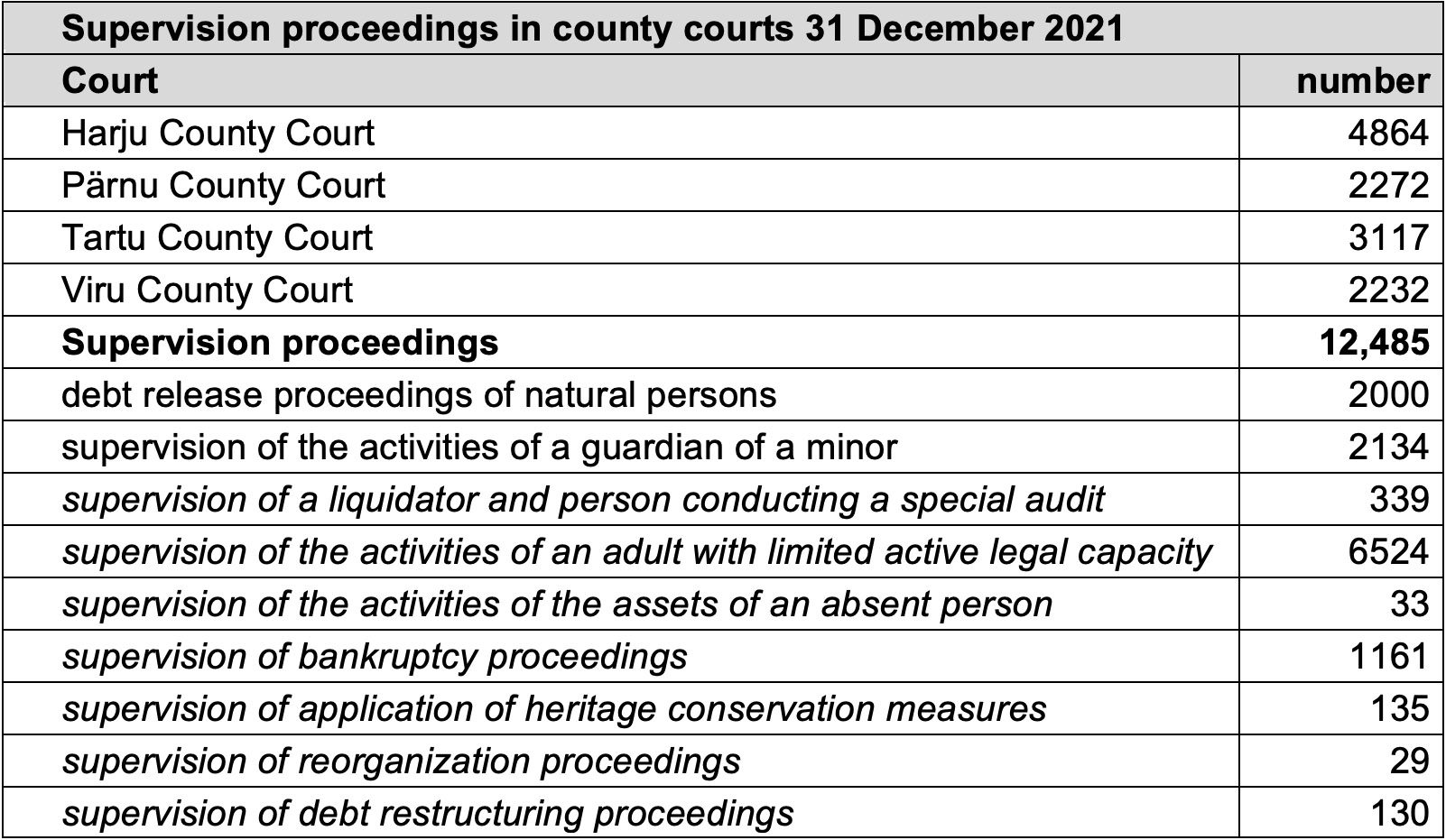
Harju County Court debt law matters
On 7 July 2021, the chairmen of circuit courts issued a joint directive deciding to partially grant a provisional petition from the Harju County Court presiding judge for reducing the workload of county court civil judges and to distribute to Pärnu and Viru county judges 543 time-intensive debt law matters with a value of[6] 217,320 load points.
From 6 September to 31 December 2021, Pärnu County Court judges were assigned 75 debt law matters worth 843.96 load points and Viru County Court judges were assigned 169 debt law matters worth 1757.6 load points, which is the annual workload of approximately 1.6 judges. During the assistance period that started in September, so-called visiting judges managed to adjudicate 87 debt law matters (about 3% of Harju County Court’s debt law matters).
Harju County Court will continue to receive assistance until the number of matters specified in the said directive is reached.
Adjudication of matters in county courts: criminal and misdemeanour matters
County courts adjudicated 13,813 criminal procedure matters and 5446 misdemeanour matters, which were distributed as follows: 28.4% of the total number of criminal and misdemeanour matters were criminal cases, and 19.4% were judges in charge of the execution of court judgments, 22.2% were preliminary investigation judge matters and 28.3% were misdemeanour matters.

On the basis of the number of matters adjudicated in county courts in 2021, general procedure matters made up 2% of the criminal/misdemeanour matters, but on the basis of load points, close to one-quarter of the workload.
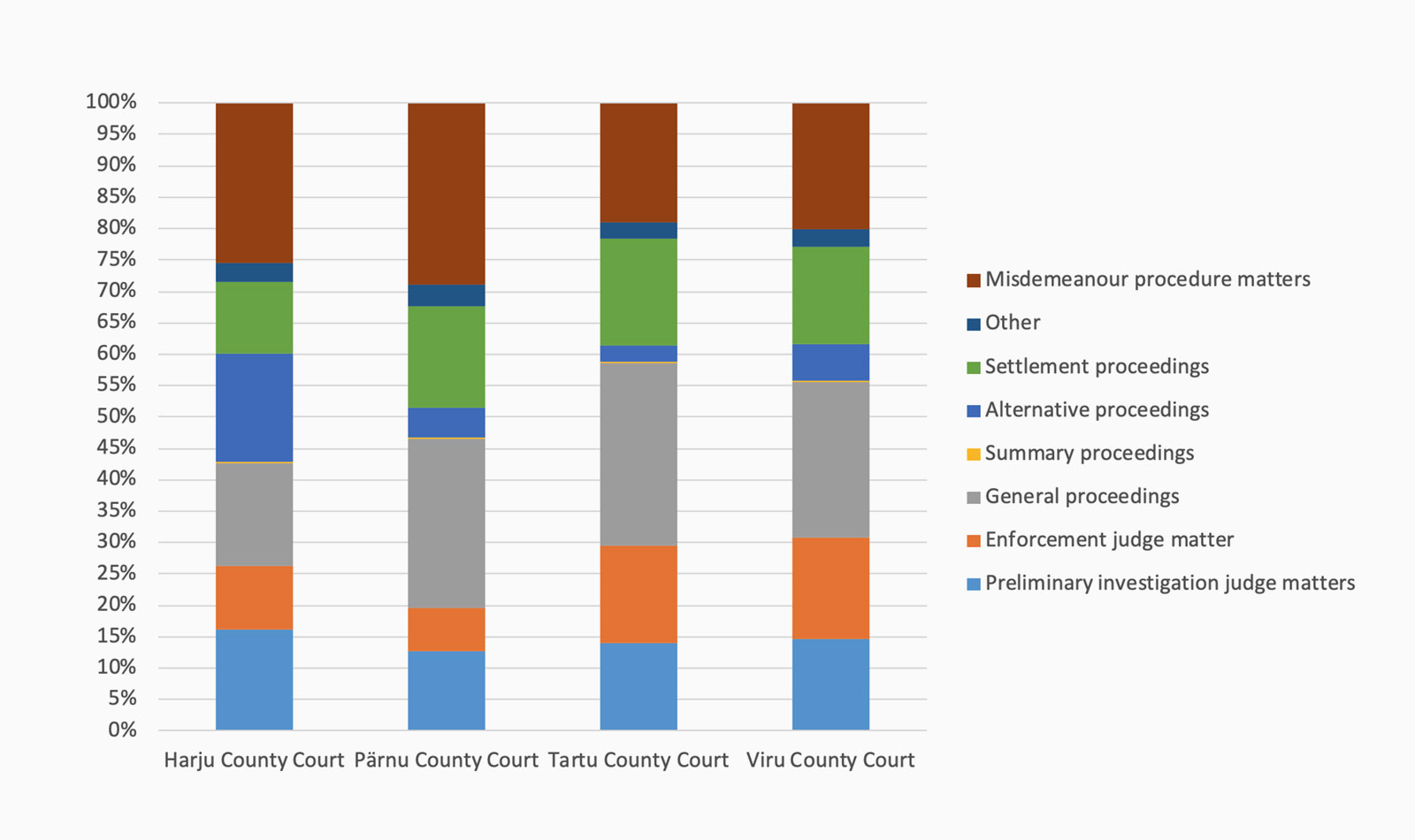
County courts adjudicated 4704 criminal matters: 1960 in Harju County Court, 666 in Pärnu County Court, 1151 in Tartu County Court and 927 in Viru County Court. The predominant share of the criminal matters – 3508 criminal matters – were adjudicated in settlement proceedings (including 444 in expedited proceedings), 839 in alternative proceedings (233 expedited), 40 in summary proceedings (two expedited) and 317 in general proceedings.
Figure 12 shows the distribution of the adjudicated criminal proceedings based on load points. Based on the workload, settlement proceedings made up close to 30% of the criminal case load and general procedure matters approximately half.
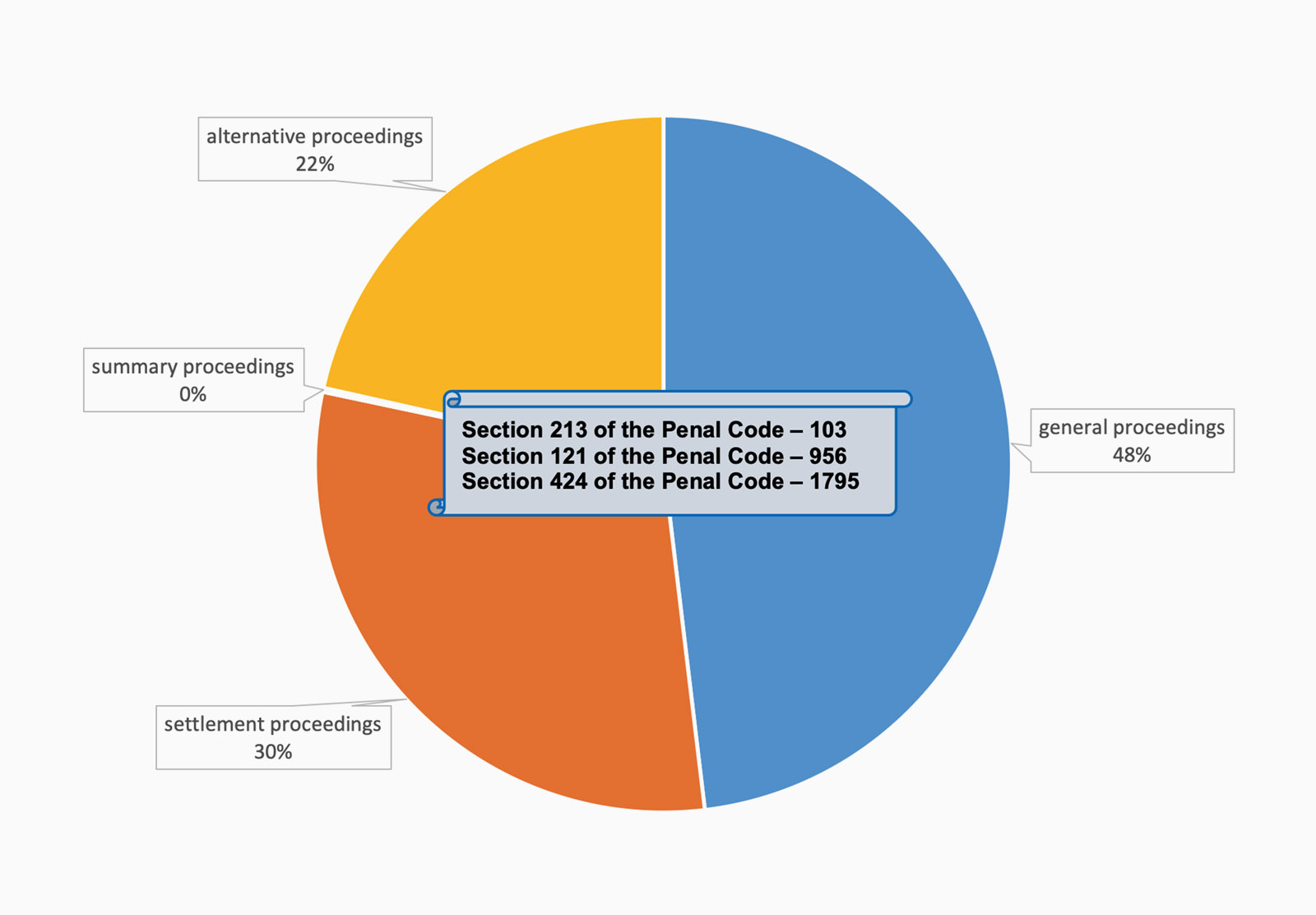
Besides the fact that general procedure matters are the most time-consuming in criminal procedure, they also vary quite widely. Based on workload methodology, the time intensiveness of general procedure matters varies widely, from 31.05 hours (mainly criminal matters with one accused) up to 935.5 hours (those with at least 15 accused).
County courts adjudicated 317 criminal matters in general proceedings; in 14.0% of the matters the victim and/or accused was a minor.
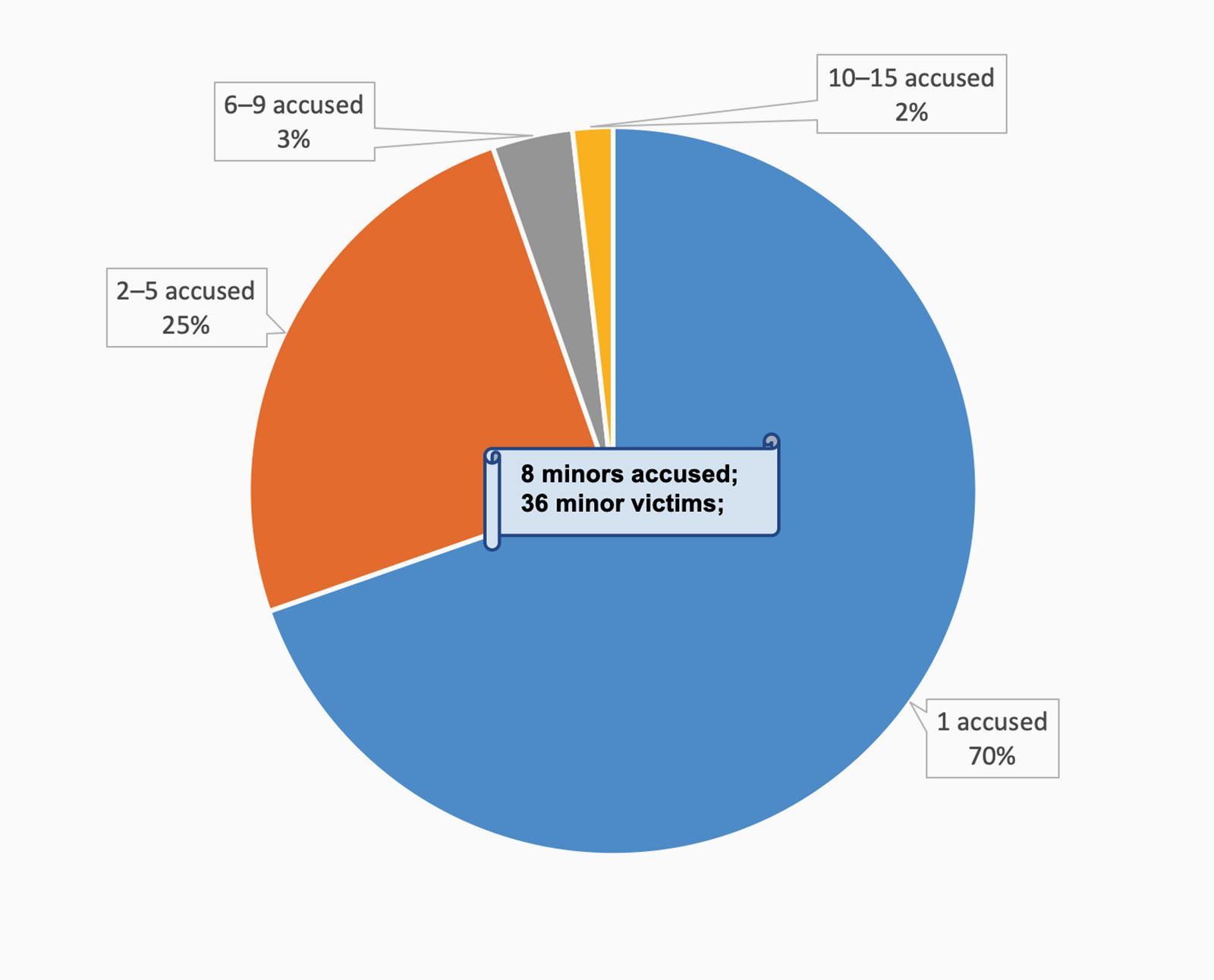
The adjudication of general procedure matters in county courts, except for Viru County Court, has become about 20% longer.
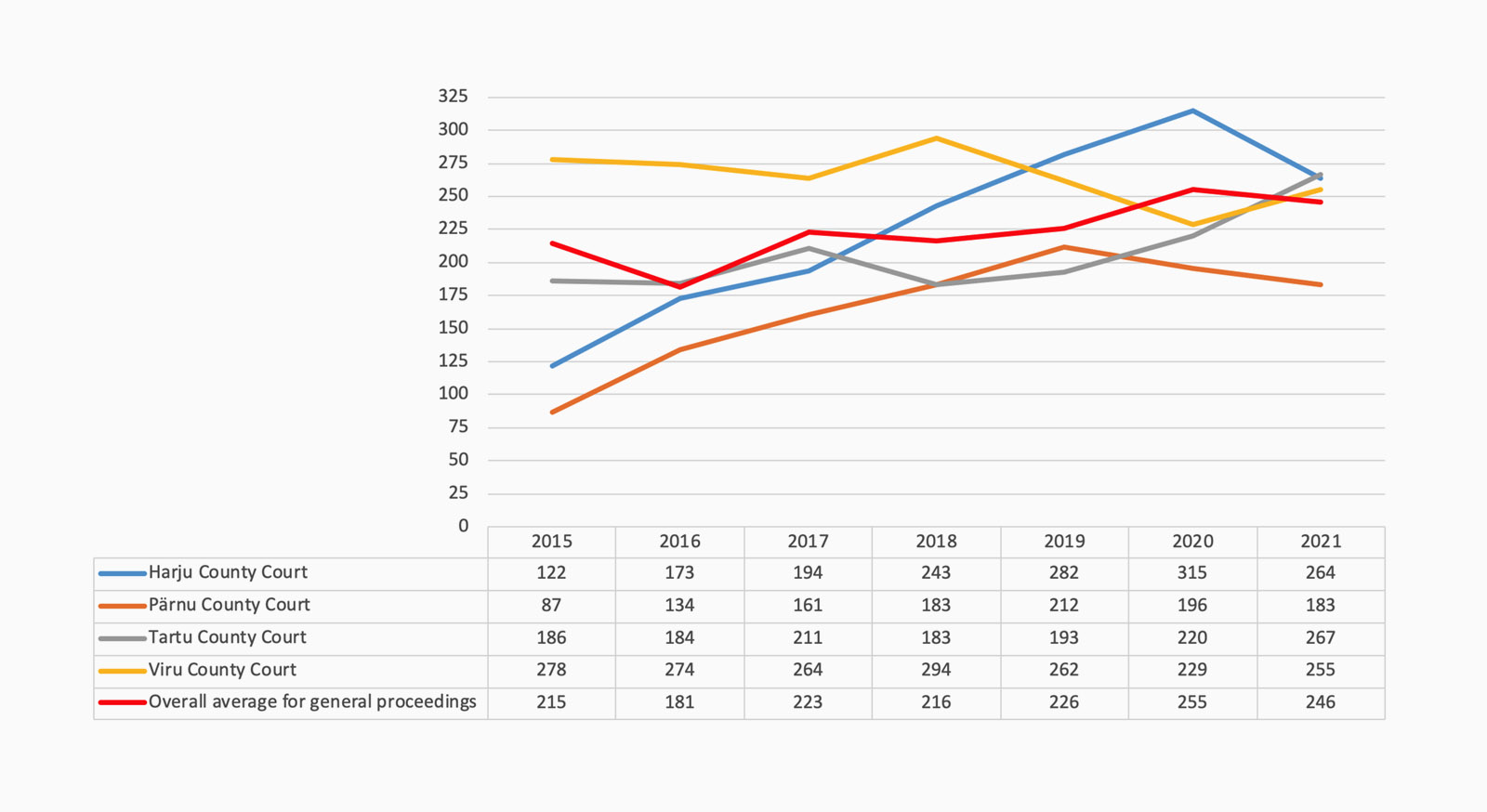
County courts adjudicated 5446 misdemeanour matters: 2416 in Harju County Court, 1001 in Pärnu County Court, 1118 in Tartu County Court and 911 in Viru County Court. An average of 32 days was spent on adjudication of misdemeanour matters; and an average of 70 days on misdemeanour complaints.
Adjudication of matters in administrative courts: administrative matters
Administrative courts adjudicated 2795 administrative matters in 2021: 1704 in Tallinn Administrative Court and 1901 in Tartu Administrative Court. According to the content of the complaint, 36.3% were law enforcement matters (of which in turn 84% were complaints by detainees), 8.9% were tax law matters, 10.9% population matters, 6.7% planning and construction matters and 5.2% were public commercial law matters.
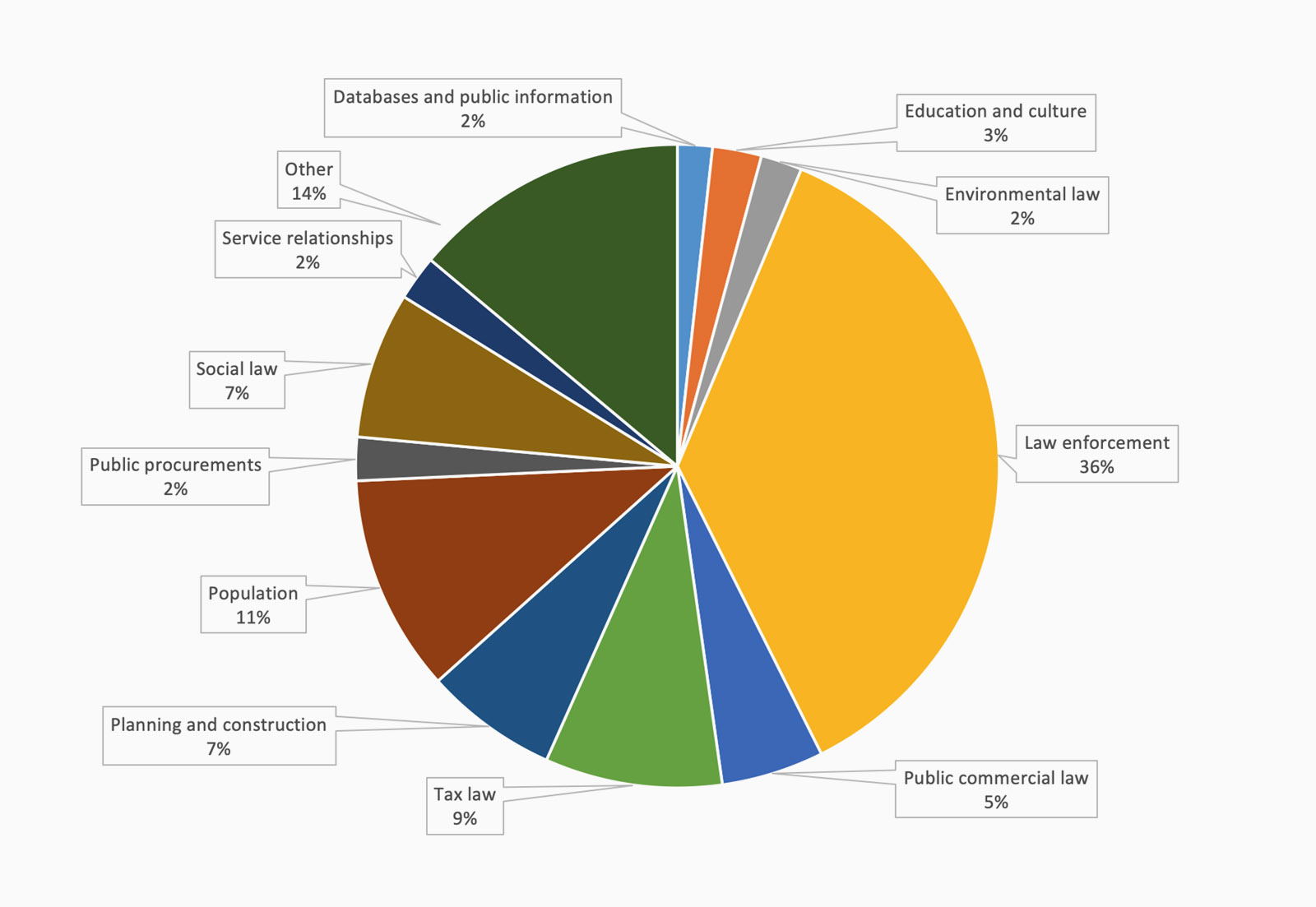
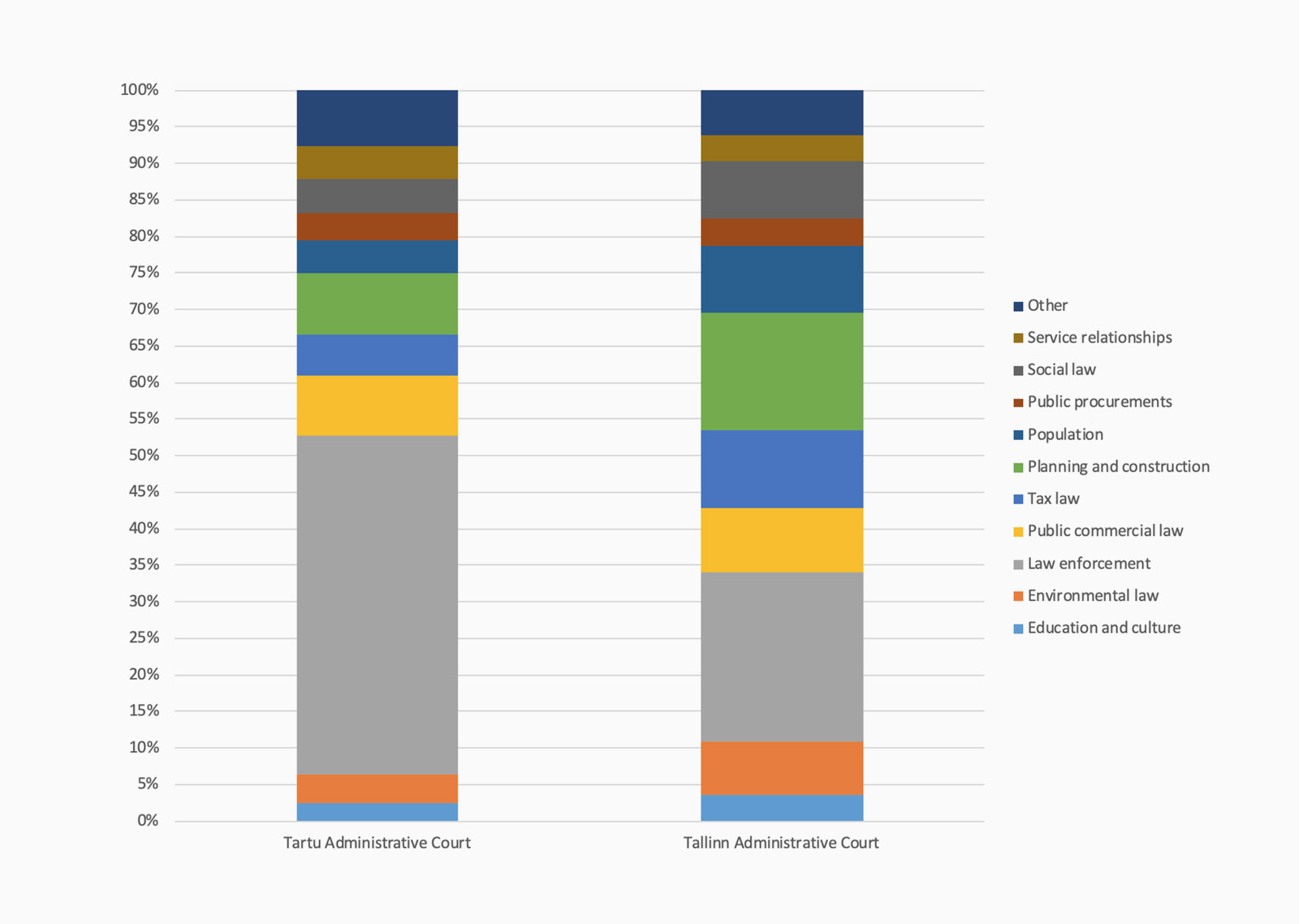
Average length of adjudication of administrative matters, taking into account the duration of adjudication of all administrative matters (general average length of proceedings) has remained the same over the last seven years. For example, the overall average procedural time at administrative courts in 2015 was 133 days and in 2021, 127 days.
At the same time, the average procedural time of administrative matters substantively resolved has changed. Over the last seven years, the average procedural time of administrative matters substantively resolved in Tallinn Administrative Court has become approximately 14% shorter but 65% longer in Tartu Administrative Court.
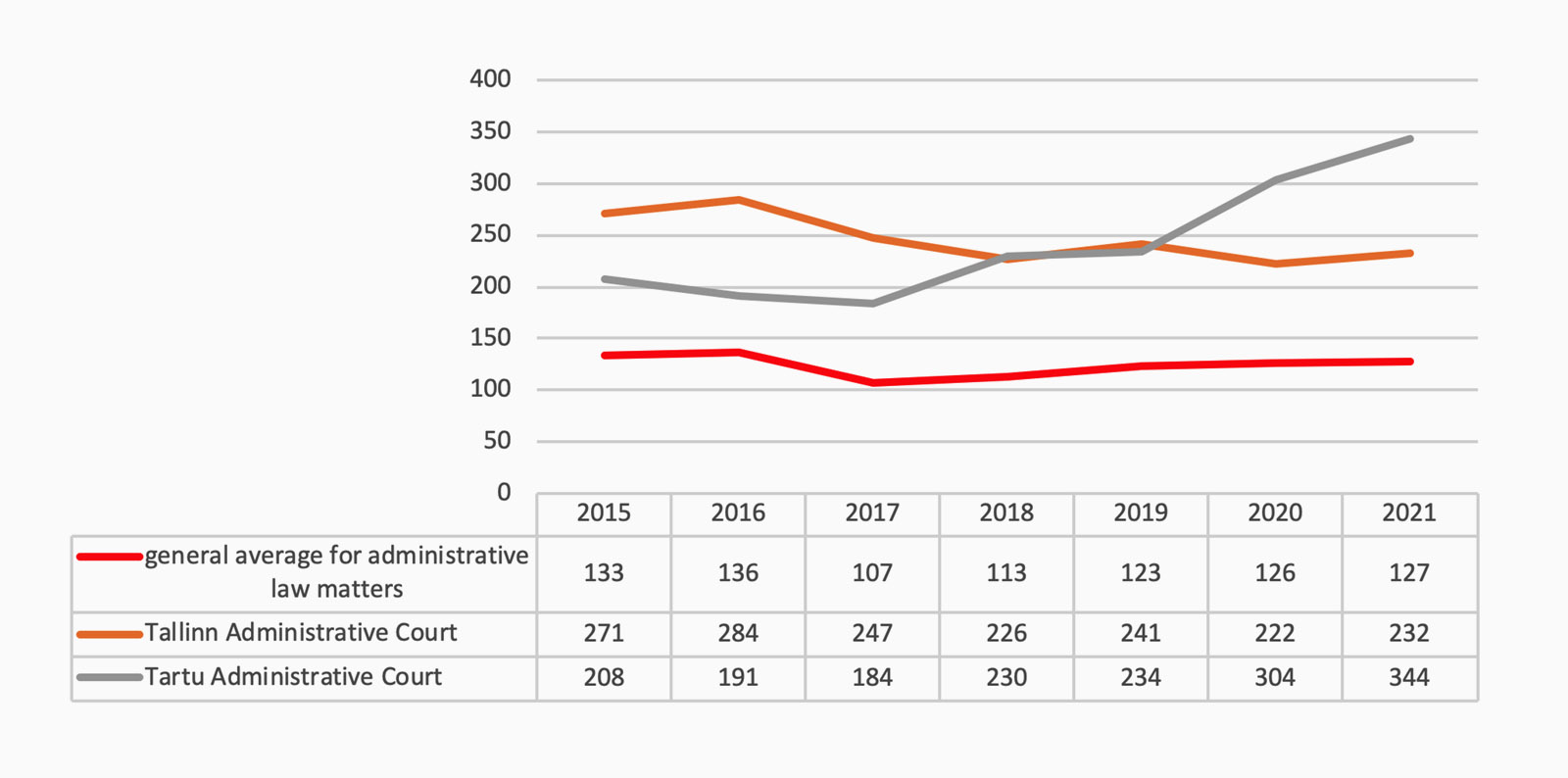
COVID-19 complaints in administrative courts[7]
The workload of the administrative courts in 2021 increased significantly in connection with the restrictions and precepts established for limiting the spread of COVID-19. The administrative courts received 265 complaints: 164 in Tallinn and 101 in Tartu.
According to the distribution of the complaints by content, prisoners’ complaints made up the biggest share (29%). The complaints challenged restrictions established in the places of detention (restrictions on gatherings, masks, movement restrictions etc.), covid infection, vaccination etc. The second largest group is made up of complaints registered as other law enforcement (27%). The complaints contest the Cabinet orders issued in 2021 (nos. 212, 305 and 362), which can be tagged as “restrictions on activities”, “vaccination” and “validity of the COVID-19 certificate”. Twelve per cent of the complaints were filed in the Defence Forces service sector, and most of these contested the release from service.
The large share of petitions for provisional legal remedy was characteristic: there were 101 submitted, both separately and accompanied by complaint.
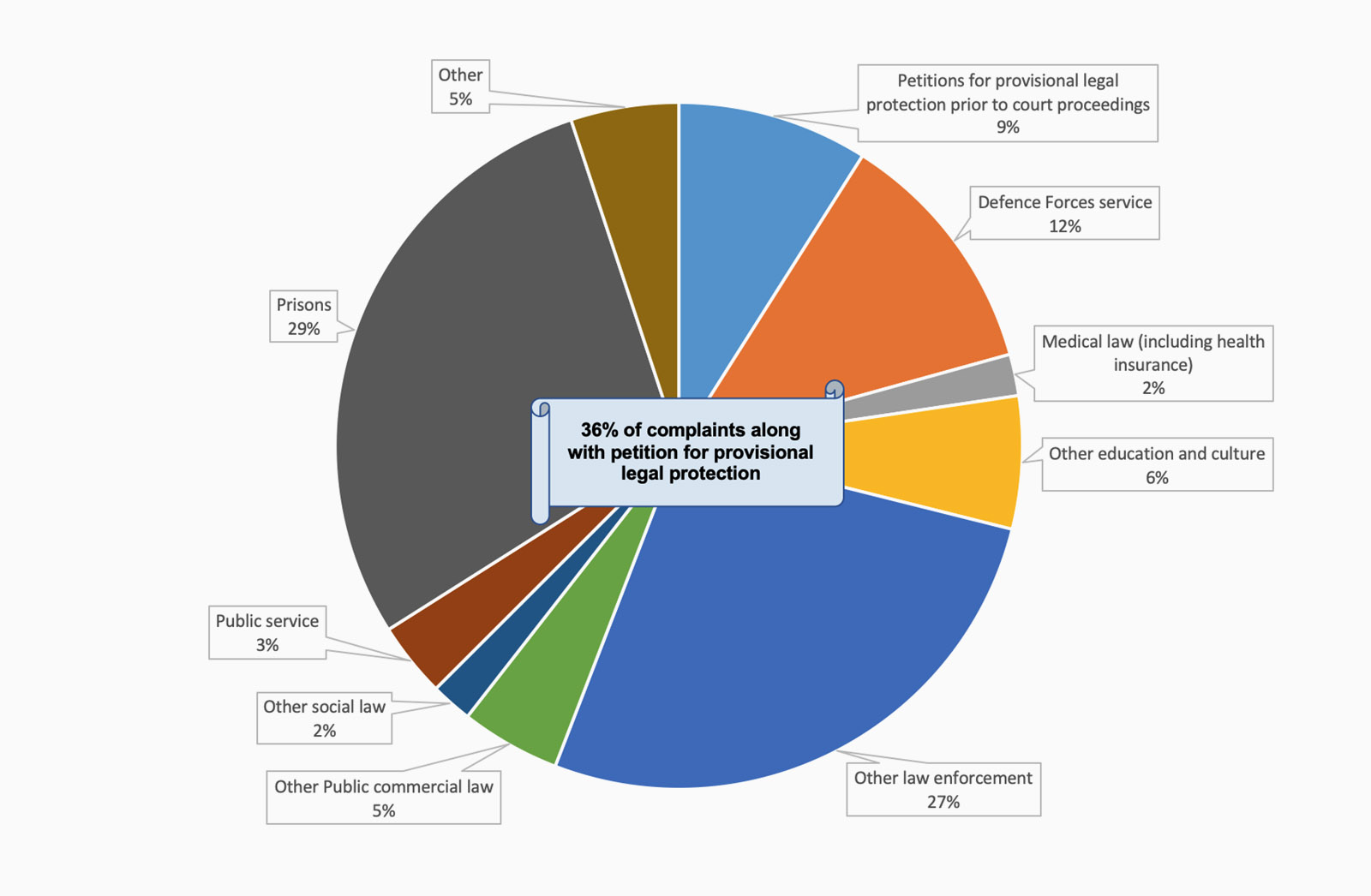
In 2021, 117 complaints were resolved (44% of complaints), of which for various reasons 89 were returned, 25 ended or not reviewed and three were granted.
Adjudication of matters in circuit courts: civil matters
Circuit courts adjudicated 2824 civil matters in 2021: Tallinn Circuit Court adjudicated 1925 and Tartu Circuit Court 899, including 1116 in appeals and 1708 in appeals against court rulings. More than one-third of the matters substantively resolved by circuit courts were debt law (31.0%) and family law matters (14.1%).
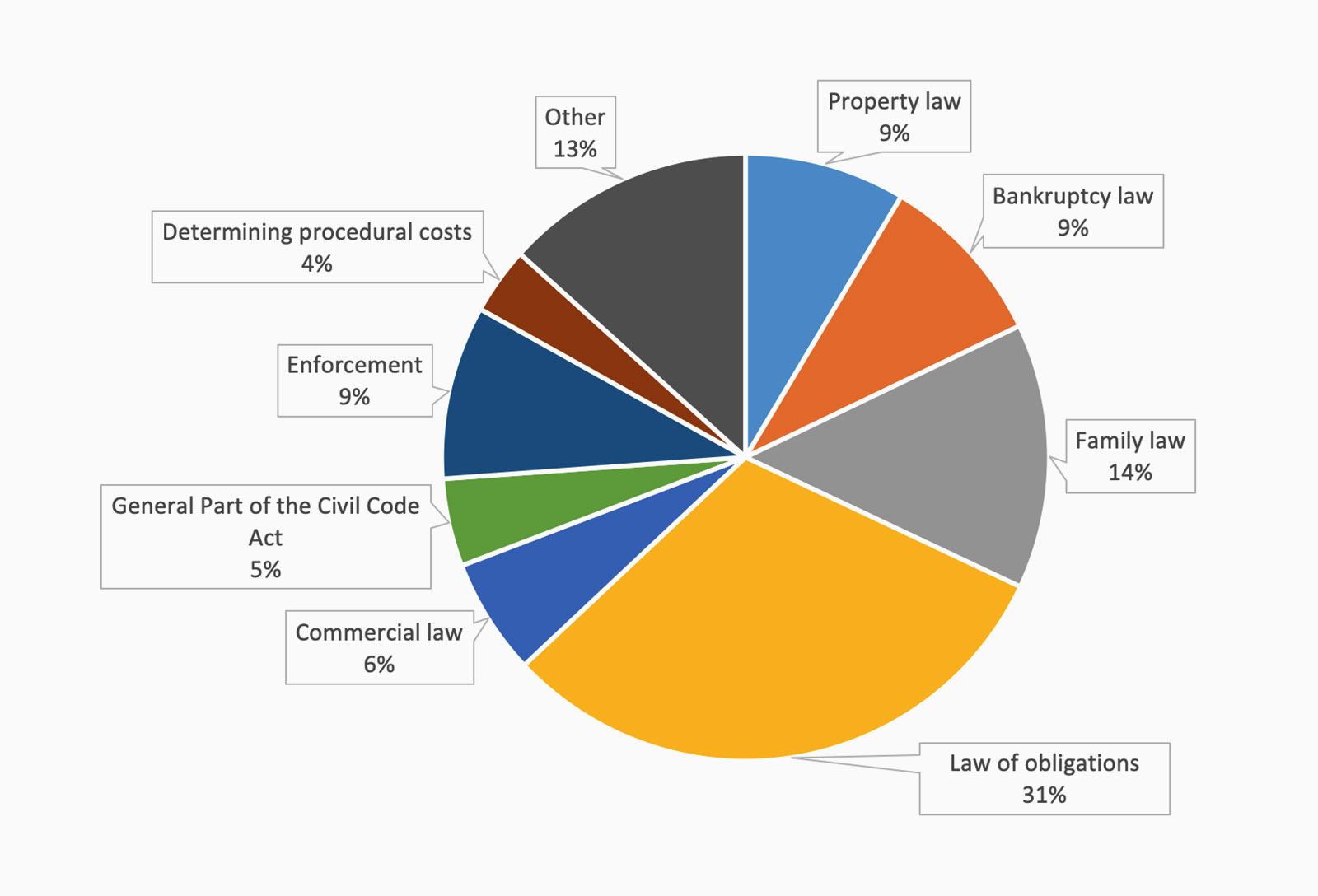
The share of matters resolved by circuit courts in appeal and appeal of court rulings (based on a county court ruling that closes proceedings) was 5.5% of all county court decisions.
Circuit courts adjudicated civil matters on appeal in an average of 163 days: The Tallinn Circuit Court adjudicated them in an average 182 days and Tartu Circuit Court in 116 days. The abovementioned matters in appeal of court rulings were resolved in an average 65 days. 92 days in Tallinn Circuit Court and 28 days in Tartu Circuit Court.

Adjudication of matters in circuit courts: criminal and misdemeanour matters
Circuit courts adjudicated 1810 civil matters in 2021: Tallinn Circuit Court adjudicated 895 and Tartu Circuit Court 915, including 400 in appeals and 1203 in appeals against court rulings. There were 198 matters that originated in circuit court. Circuit courts adjudicated 142 misdemeanour matters: 77 in Tallinn Circuit Court and 65 in Tartu Circuit Court.
Of the matters adjudicated in circuit courts, one-quarter were made up by criminal matters (26.1%) and the largest number were still matters of judges in charge of the execution of court judgments (33.6% of maters adjudicated) and 18.9% preliminary investigation judge matters. The share of misdemeanour maters in criminal chambers made up 7% of matters adjudicated.
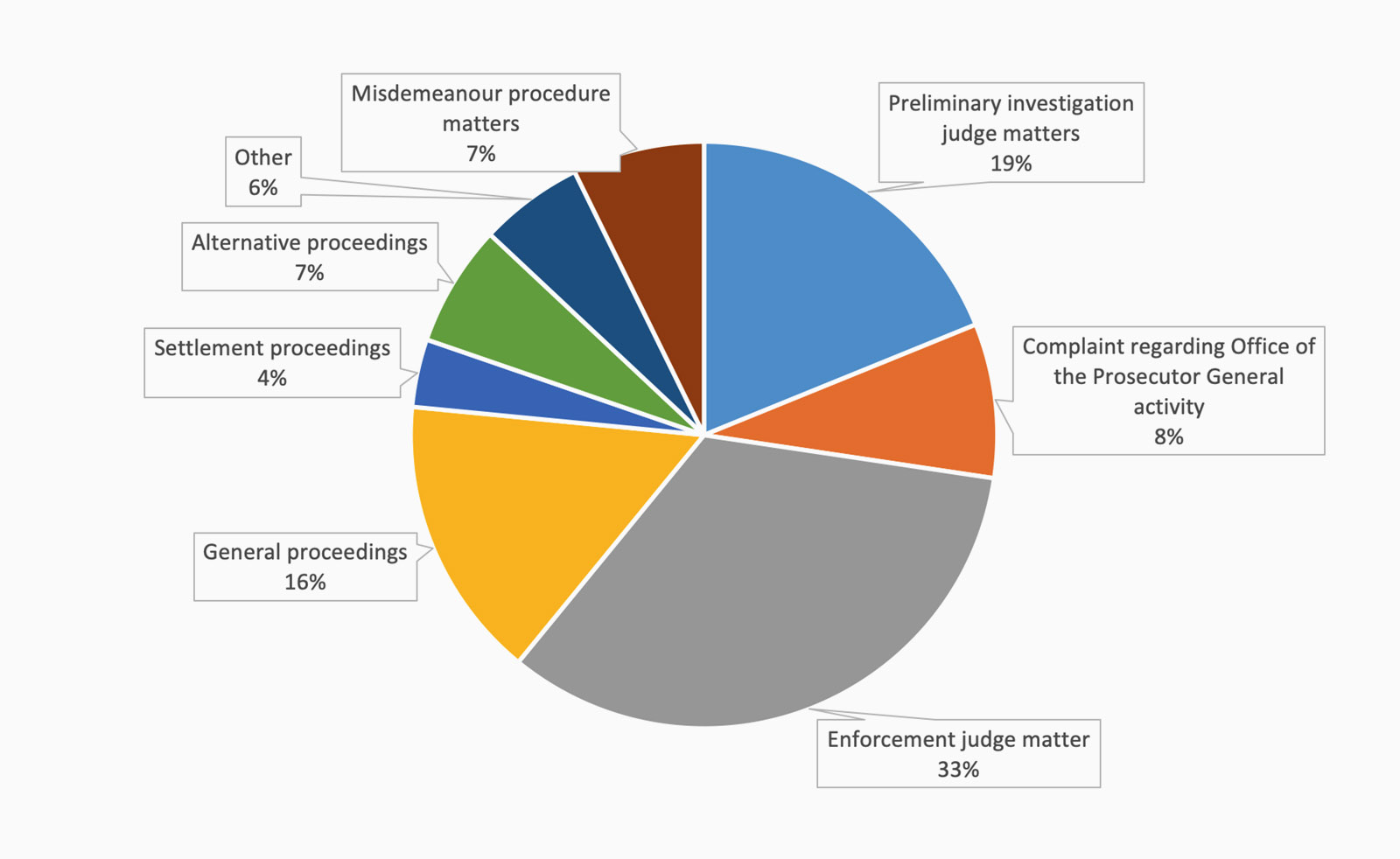
The share of criminal matters resolved in circuit courts made up 9.9% of county court decisions.
Criminal matters were adjudicated on appeal in an average of 66 days: 45 days in Tallinn Circuit Court and 59 days in Tartu Circuit Court. In the last six years, the average appeal proceedings have become longer in both circuit courts, more than one-third in Tartu Circuit Court and twice in Tallinn Circuit Court.
The average time for appeals of court rulings continues to be short – an average of 16 days in circuit courts: 17 days in Tallinn Circuit Court and 15 days in Tartu Circuit Court.

Adjudication of matters in circuit courts: administrative matters
Circuit courts adjudicated 1372 administrative matters in 2021: Tallinn Circuit Court adjudicated 829 and Tartu Circuit Court 543, including 459 in appeals and 912 in appeals against court rulings.
By content, the greatest number of matters adjudicated in circuit courts were law enforcement matters (41.1% of matters resolved). Of the remaining 60%, population (9.5%), planning and construction (8.8%) and tax law (8,5%) matters stood out.
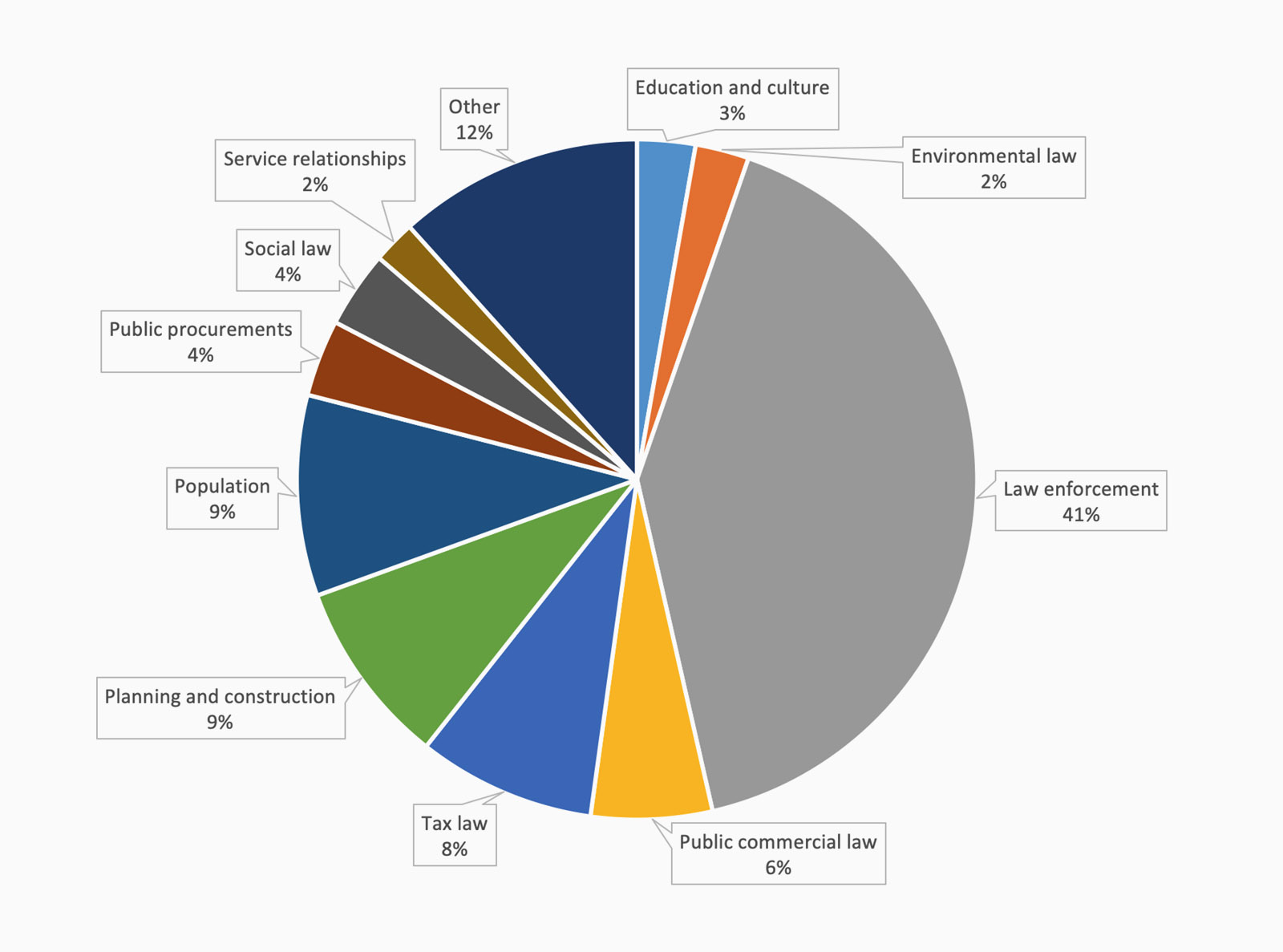
The share of matters resolved by circuit courts in appeal and appeal of court rulings (based on an administrative court ruling that closes proceedings) was 32.5% of all county court decisions.
Circuit courts adjudicated administrative matters on appeal in an average of 214 days: the Tallinn Circuit Court adjudicated them in an average 183 days and Tartu Circuit Court in 281 days. The abovementioned matters in appeal of court rulings were resolved in an average 34 days: 41 days in Tallinn Circuit Court and 31 days in Tartu Circuit Court. In the last six years, the length of appeal proceedings has fluctuated, but is somewhat shorter than in 2016: about 22% in Tallinn Circuit Court and 4% in Tartu Circuit Court. The length of proceedings on appeal of court rulings has not changed in either circuit court in recent years.
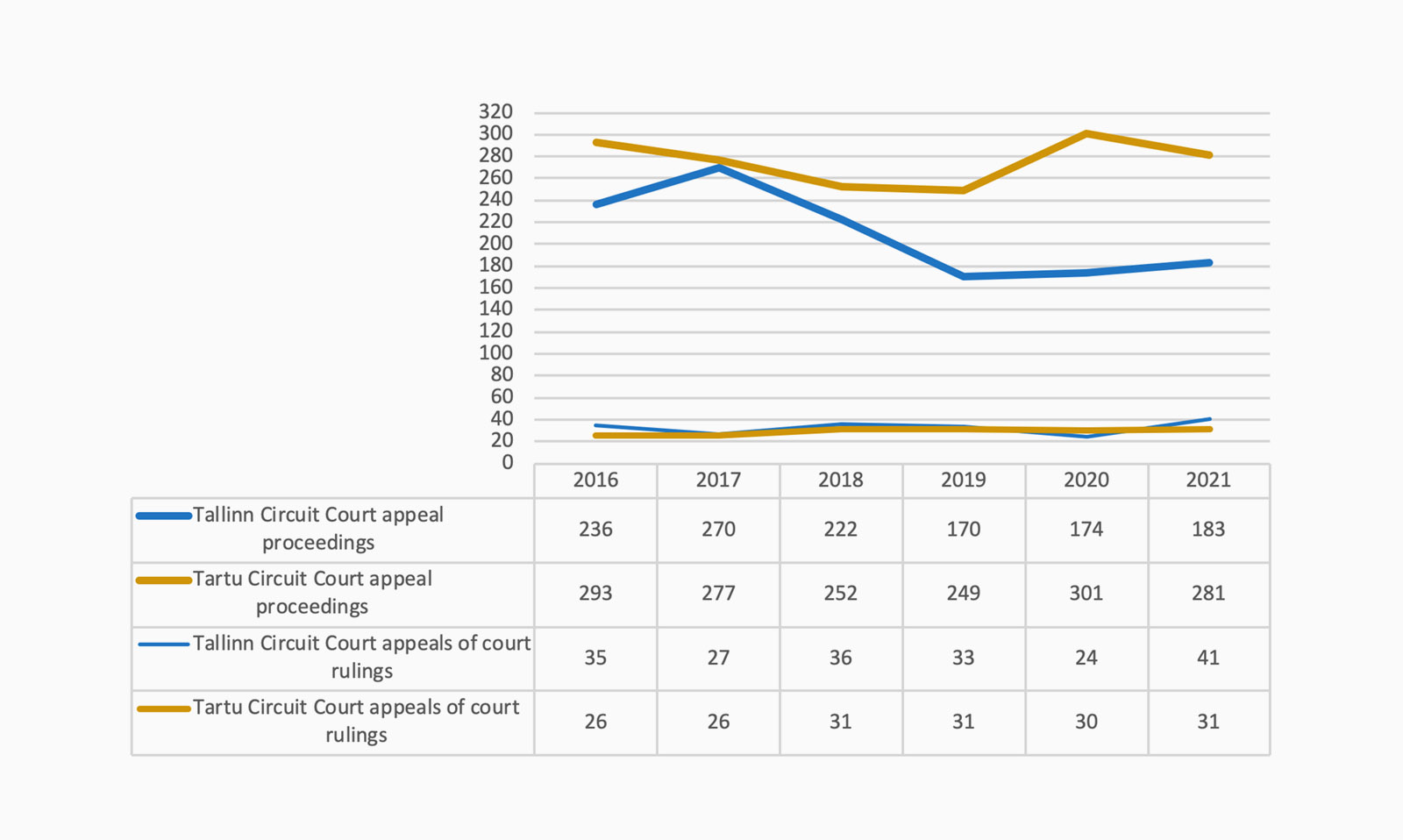
Written and paperless proceedings in courts[8]
Figures 25–28 show the share of written proceedings that are conducted in a paperless manner in the courts.
Figure 25 shows the relative importance of written proceedings in recent years. It shows, by each type of proceeding, the resolved matters in which no hearings were held during the proceedings.
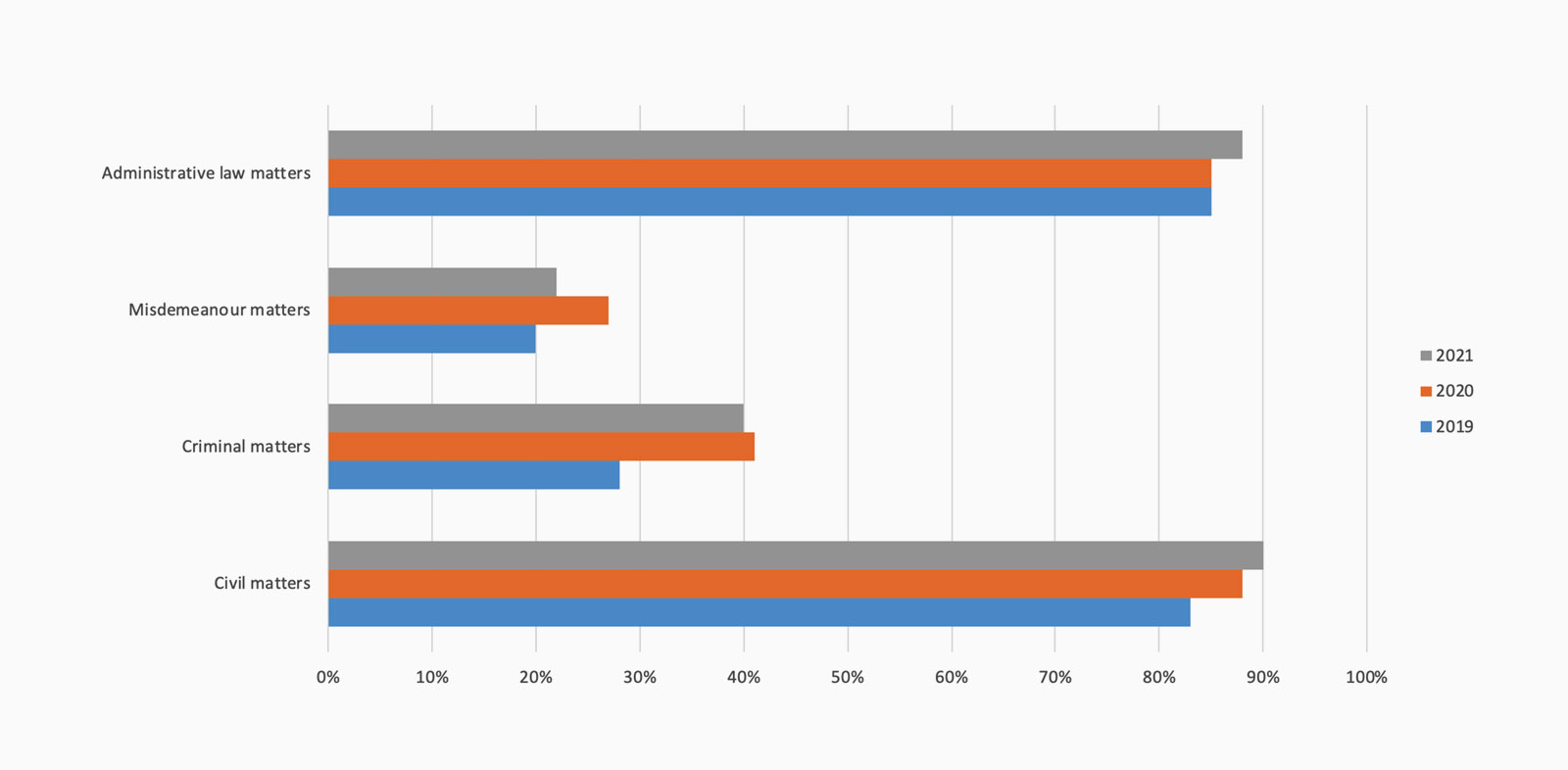
Figure 26 shows the relative importance of written proceedings by each court and type of proceeding. Written proceedings are predominant in both administrative and civil matters as well as in misdemeanour matters adjudicated in circuit courts.
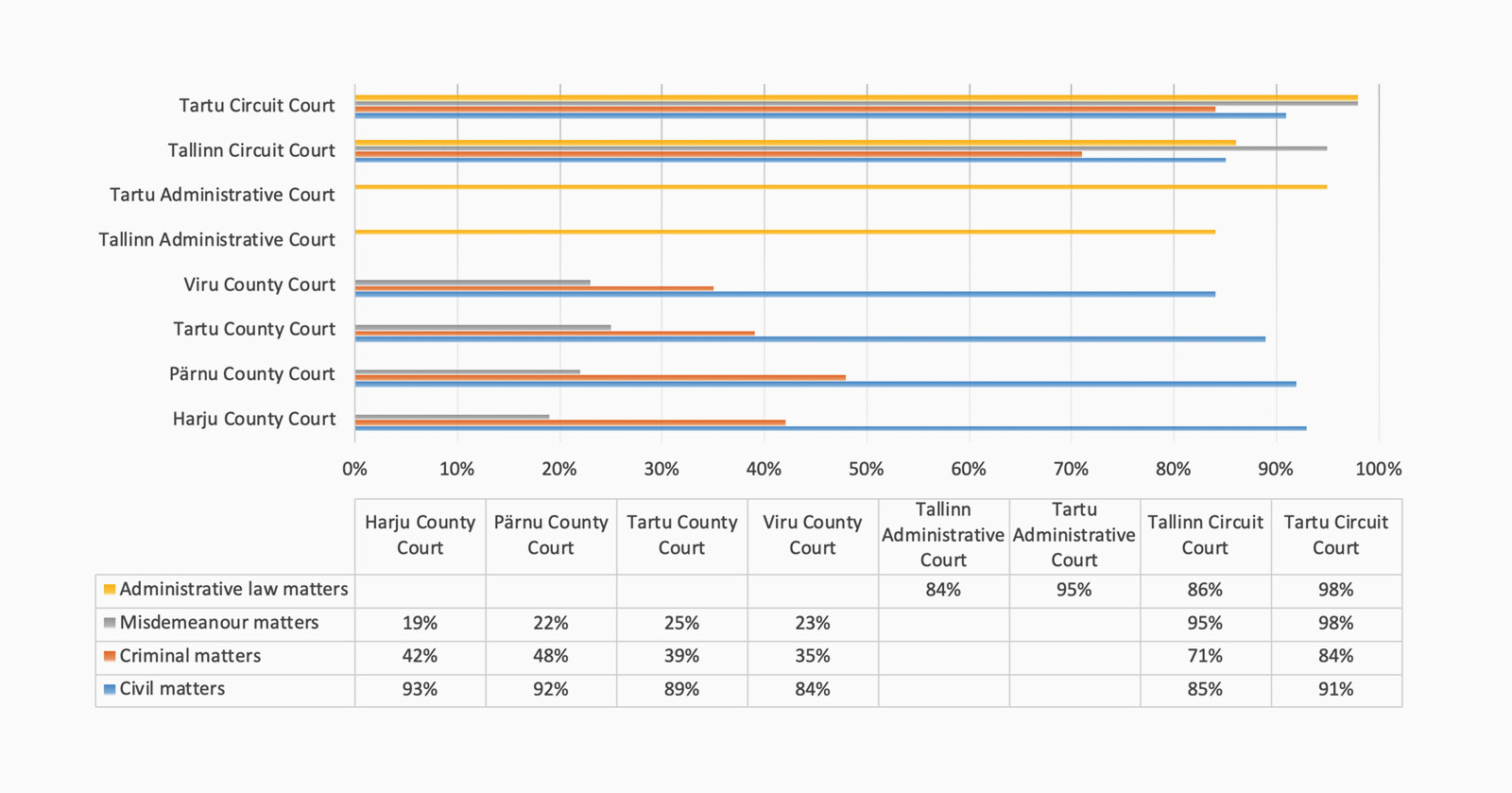
Figure 27 shows the relative importance of digital proceedings in recent years. Compared to 2020, the share of digital has increased in all types of proceeding. The share of digital has increased the most in administrative matters. In criminal proceedings, some preliminary investigation judge matters and matters of judges in charge of the execution of court judgments are resolved in digital proceedings.
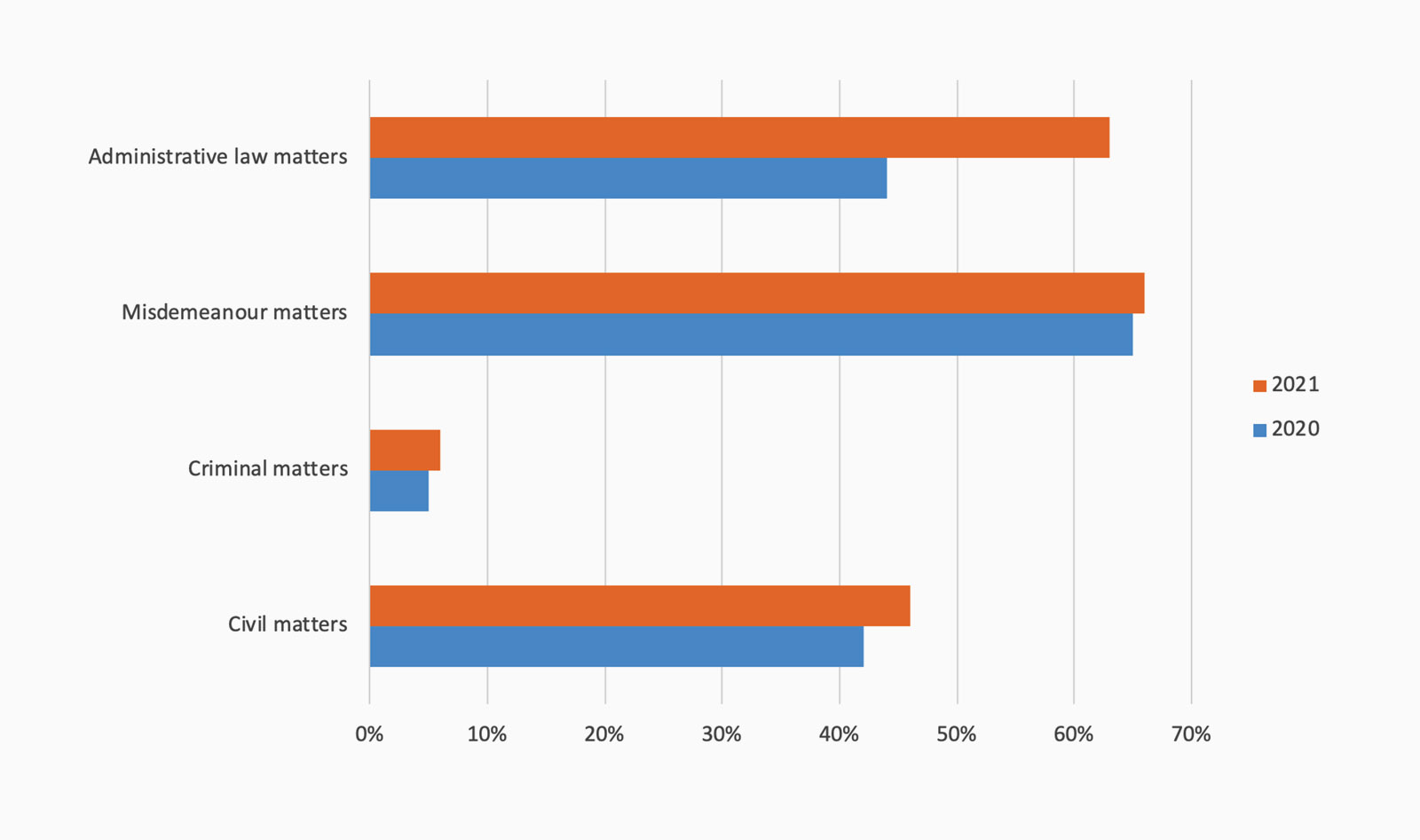
Figure 28 shows the relative importance of paperless proceedings in matters adjudicated in 2021 for each court and type of proceeding. The share of digital proceedings is highest in Tallinn Administrative Court, where 86% of matters were resolved digitally and in Tallinn Circuit Court – 81% of administrative proceedings.
As regards civil proceedings, the share of matters resolved digitally was between 36–53%: in the largest court, Harju County Court; 53% of civil matters were adjudicated in paperless proceeding.
Viru County Court stands out in regard to adjudication proceedings – 751 preliminary judge matters, sate legal aid and international cooperation matters were resolved in digital proceedings. Although the share of digital proceedings in the criminal proceedings in Harju and Pärnu county courts is given as 0%, these courts have in fact also adjudicated some matters of judges in charge of the execution of court judgments, state legal aid and international cooperation matters have also been resolved in digital proceedings there.
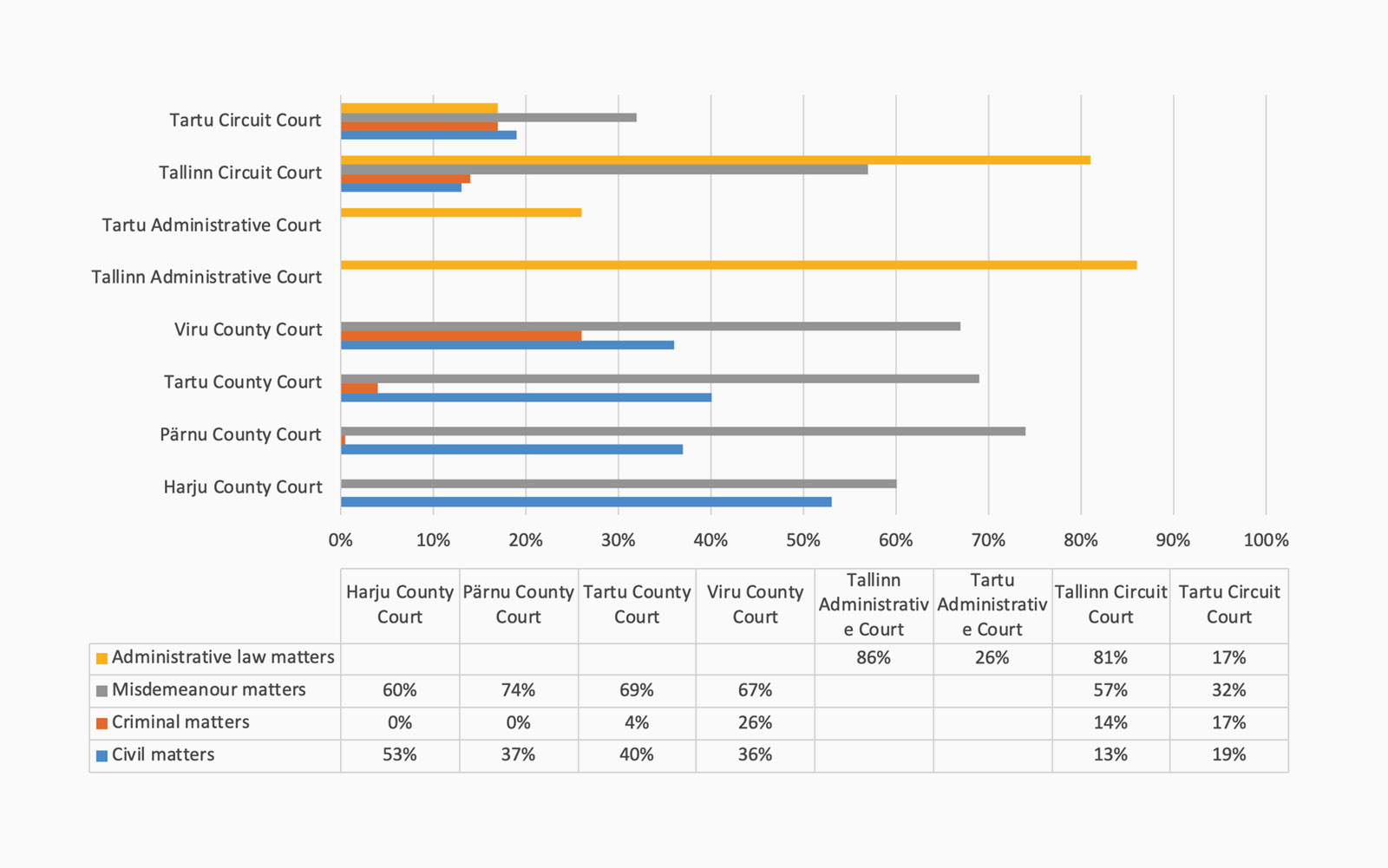
____________________________
[1] Background information. Overview of crime 2021. – https://www.kriminaalpoliitika.ee/kuritegevus2021/. Criminal procedure matters include all matters received by the county courts in criminal court proceedings, which fall into the following categories: preliminary investigation judge matters, matters of judges in charge of execution of court judgments, settlement proceedings, alternative proceedings, summary proceedings, general proceedings, administration of compulsory psychiatric treatment matters, international cooperation matters and state legal aid matters.
[2] This figure shows the total number of civil matters submitted to county courts and expedited procedures of payment orders submitted to Pärnu County Court’s Haapsalu Courthouse, with supervision proceedings omitted.
[3] See https://www.kohus.ee/sites/default/files/dokumendid/I%20ja%20II%20astme%20kohtute%202021.a%20menetlusstatistika_1.pdf (09.03.2022).
[4]These figures are based on the specialization of the judges and vacant positions and long-term absences from work (more than three consecutive months).
[5] Serving on a panel of judges is not included in the workload of a circuit court judge.
[6] Unjustified enrichment, unlawful causing of damage, other non-contractual obligations, contracts for services, and contracts for provision of healthcare services.
[7] Source: courts information system and administrative courts.
[8] Written proceedings – no hearing registered in the courts information system; Paperless proceedings – registered as digital proceeding in the courts information system but it is not ruled out that a paper dossier is also maintained simultaneously.



